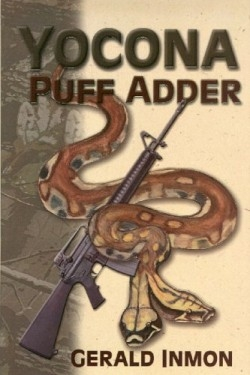Yocona Puff Adder
Native Mississippians are proud to proclaim that they are wedded to the land. The narrator of this fictionalized account of growing up in this Deep South state in the 1950s makes that fact perfectly clear in the first chapter. He describes his youthful recollection as the “morning sun brings vapors out of the Mississippi ground” and “dampness from the soil soaks through double-padded knees of well-worn, oft-washed Sears and Roebuck jeans.”
Vivid descriptions of the land by the narrator permeate this book as the author grows and matures in Oxford, the town that he shared with novelist William Faulkner.
Described as “historical faction,” Yocona Puff Adder is a thinly veiled, personal account of the author’s adventures growing up in this historic Mississippi landmark city. The book’s fifty-one chapters are freestanding, yet connected, short stories, drawn from the author’s life as a professional forester, soldier and, wildlife biologist.
The early chapters center on the adventures of C.B., a black country youth, and Scott, the white narrator, who has more of a city orientation. Their friendship extends beyond the segregated south of that mid-1950s era, with the two boys living in a world of their own.
Part of that world includes a flamboyant author, Mr. Jefferson, a fictionalized account of Faulkner. It is Mr. Jefferson who is responsible for the book’s enigmatic title. When the boys describe to him the terrifying copper-headed snake that had gone after them, puffing itself up when threatened, Mr. Jefferson explained, at length, that the boys described an exotic reptile named after Yocona, a small community near Oxford.
“If I was a betting man, I’d say what you saw was more than likely the Yocona Puff Adder,” he said. “More properly named, spreading adder.”
The book carries them into adulthood, where their paths diverge, with C.B. serving in Vietnam as a combat sniper and Scott becoming engrossed in a college forestry program, cloistered from the world partly to avoid the draft.
A college-age Scott writes, “While C.B. is probably worried about getting wasted for real, I feel guilty for thinking I’m wasting away trying to digest subject matter like forest history and policy theory. Indoor classes eat away at my mornings. Each course gobbles up an hour a day for two or three days a week…but it’s not Vietnam.”
As the chapters progress, the text gets progressively more sophisticated in its language. C.B. returns from the war and joins the U.S. Forest Service with Scott, and the two pursue parallel careers in that field—continuing to care for the land on which they were born.
A reader unfamiliar with southern dialect writing in the style of Mark Twain will likely get frustrated with the book’s earlier passages. But if the reader sticks with it, the book and the characters’ lives take root and grow, and the results lead to some wonderful revelations about the south and the lives of its people.
Reviewed by
Karl Kunkel
Disclosure: This article is not an endorsement, but a review. The publisher of this book provided free copies of the book to have their book reviewed by a professional reviewer. No fee was paid by the publisher for this review. Foreword Reviews only recommends books that we love. Foreword Magazine, Inc. is disclosing this in accordance with the Federal Trade Commission’s 16 CFR, Part 255.

